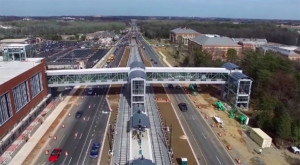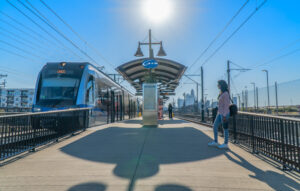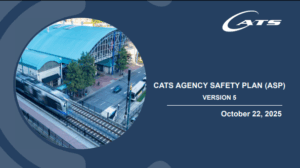 Charlotte is launching a sweeping crackdown on fare evasion and public safety across its light rail system following pressure from the Trump administration over the tragic murder of Iryna Vasyliv on the light rail. Federal transportation officials demanded urgent reforms after the city’s handling of safety and fare enforcement came under scrutiny.
Charlotte is launching a sweeping crackdown on fare evasion and public safety across its light rail system following pressure from the Trump administration over the tragic murder of Iryna Vasyliv on the light rail. Federal transportation officials demanded urgent reforms after the city’s handling of safety and fare enforcement came under scrutiny.
In September 2025, the U.S. Department of Transportation (USDOT) and Federal Transit Administration (FTA) sent formal inquiries to the city, questioning how the Charlotte Area Transit System (CATS) managed security and federal transit dollars. Mayor Vi Lyles responded in a September 25 letter to the administration, pledging to overhaul the system’s safety policies and fare enforcement rules. She promised “immediate and measurable improvements” to restore public confidence and comply with federal standards.
$30 Million Security Overhaul and Fare Enforcement Expansion
In direct response to Washington’s demands, CATS is committing more than $30 million over the next two years to upgrade surveillance systems, increase police presence, and tighten fare enforcement across the Blue Line and city bus routes.
The system’s 4,500 cameras are being replaced with higher-resolution units and expanded to cover blind spots at train stations and along platforms. For the first time, CMPD officers will gain real-time access to CATS’ live video feeds, allowing immediate response to crimes and emergencies. CATS is also investing $4.2 million in new video analytics software that uses artificial intelligence to detect banned riders, loitering, or threats before incidents escalate.
The fare enforcement budget alone will increase by $1.6 million to fund additional patrol officers, undercover inspectors, and mobile ticket scanners. CATS has also allocated $900,000 to modernize its fare validation equipment, replacing aging hardware and integrating digital payment options through its mobile app.
“We are ending the culture of free rides and restoring accountability,” said interim CEO Brent Cagle. “Our fare system isn’t just about revenue — it’s about restoring public confidence in the safety and integrity of Charlotte transit.”
New “Fare Zone” Enforcement Policy
 Under the city’s new Fare Zone Enforcement Plan, every passenger must show proof of payment while inside designated light rail and transit center areas. Riders caught without a valid ticket face a $50 fine for the first violation, $100 for a second, and up to $150 plus removal from the system for repeat offenses.
Under the city’s new Fare Zone Enforcement Plan, every passenger must show proof of payment while inside designated light rail and transit center areas. Riders caught without a valid ticket face a $50 fine for the first violation, $100 for a second, and up to $150 plus removal from the system for repeat offenses.
The days of leniency — when homeless individuals or others could board without payment — are officially over. Charlotte leaders say the decision was difficult but necessary to maintain order and fairness for paying passengers. In addition, individuals who repeatedly violate fare or conduct rules may be banned for up to 90 days from using any CATS services.
So far in 2025, CATS security teams and CMPD officers have issued 1,570 fare citations and excluded 106 riders for repeated violations. Those figures are expected to rise as enforcement increases citywide.
Infrastructure and Safety Investments
 In coordination with the fare crackdown, CATS is expanding its physical safety infrastructure.
In coordination with the fare crackdown, CATS is expanding its physical safety infrastructure.
-
$5 million will go toward upgrading lighting at all 19 Blue Line stations and key bus transfer points.
-
$2.7 million is allocated to new emergency call towers and intercoms, allowing riders to contact police directly from platforms.
-
An additional $6 million will fund the construction of a new Integrated Operations and Security Control Center, where police, bus, and rail staff will monitor the system around the clock.
CATS is also expanding its partnership with ELERTS PROTECT, a mobile safety app that allows riders to discreetly report harassment, vandalism, or suspicious activity. The updated platform will include faster routing to dispatchers and a new feature for anonymous fare evasion tips.
Federal Oversight and Local Accountability
The Trump administration’s transportation officials have reportedly made clear that Charlotte’s continued access to federal infrastructure funding — estimated at over $60 million through 2028 — depends on measurable safety and compliance improvements. The administration’s position echoes a national push to increase local accountability in federally supported transit systems.
Mayor Lyles’ letter acknowledged that Charlotte’s previous policies had “allowed gaps in enforcement and security that do not meet federal standards.” She pledged to personally oversee quarterly progress reports sent to Washington and vowed that “CATS will not return to a period of lax oversight.”
A New Era for Charlotte Transit
CATS’ reform package comes as the city prepares for its long-term transition into a Metropolitan Transit Authority in 2026 — a process also being closely monitored by the state legislature and federal officials.
For riders, the most immediate difference will be visible: more officers, fewer fare evaders, and safer platforms. For city leaders, it represents a turning point — one that shows Charlotte’s determination to meet federal demands, improve public safety, and rebuild trust after years of criticism.
“This isn’t just a policy shift,” said Mayor Lyles. “It’s a commitment to every rider that our system will be safe, accountable, and worth the fare.”


